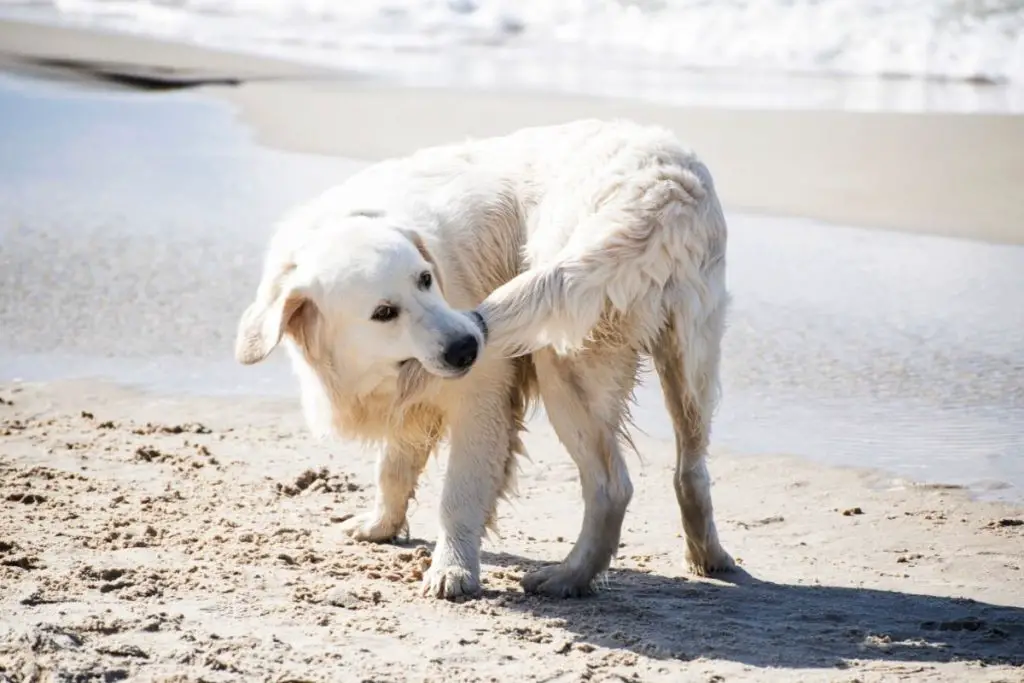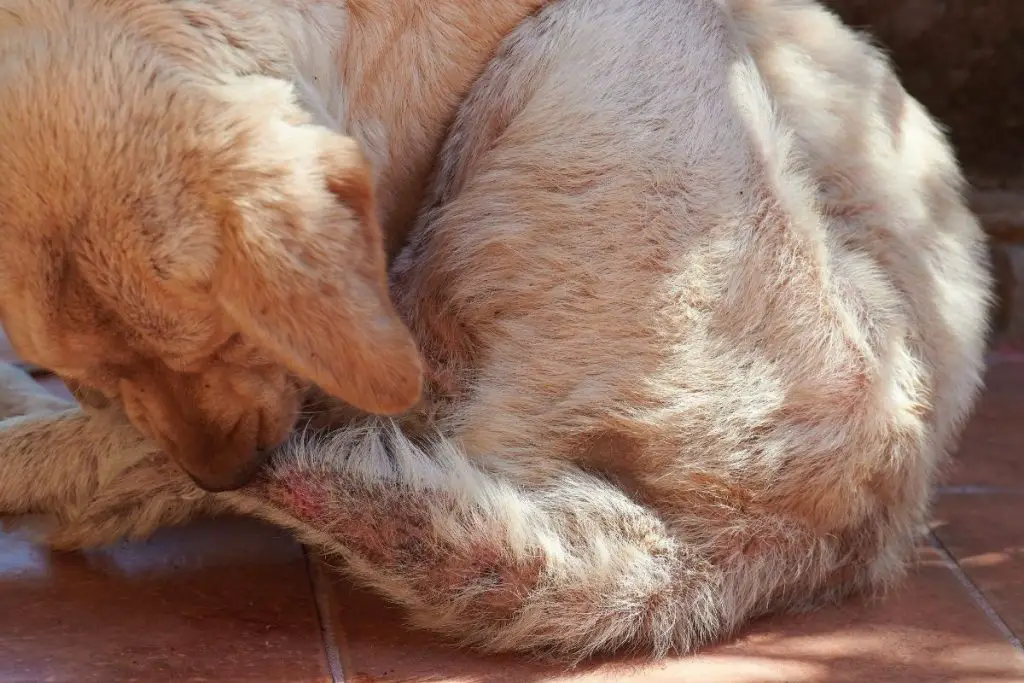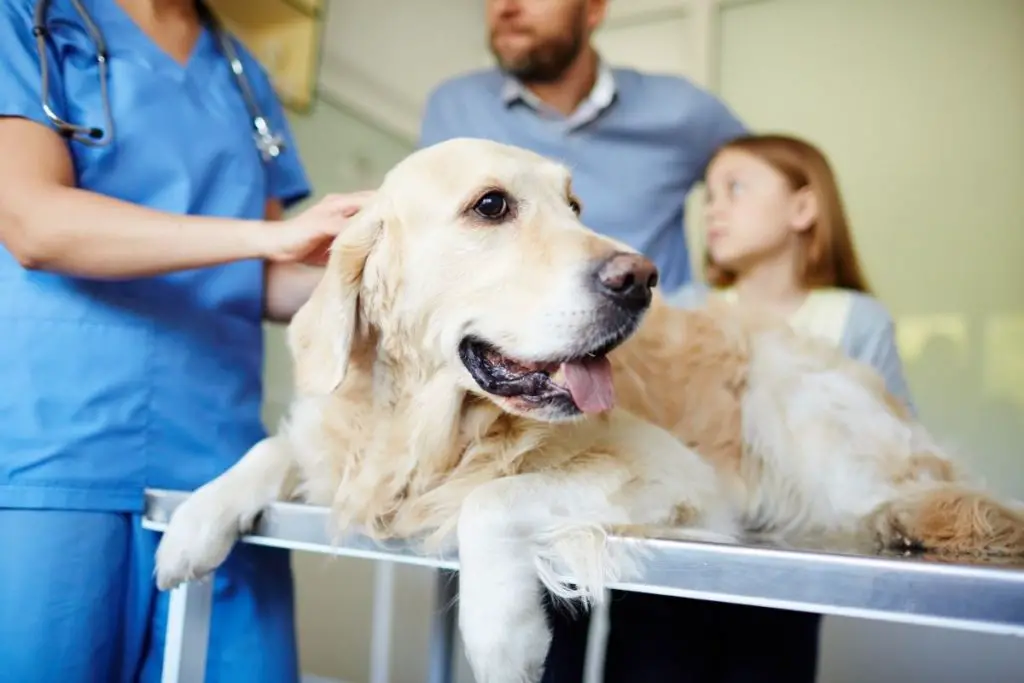Have you noticed your dog biting his or her tail more often than usual? There are a wide variety of reasons this could be happening. Boredom, injury, allergies, the list goes on.
In this article, we are going to look at the potential reasons why your canine friend is biting their tail and hopefully, we can suggest some things you can do to alleviate this problem. So, without further ado, let us begin.

Reasons Why This Is Happening
Parasite Infection
One reason your dog might have taken to chewing their tail is because they are reacting to a parasitic infection. The most common culprits are ticks and fleas, which are more common in the summer and spring when it is warm. It is because of these parasites that your dog will lick and bite and chew on a spot to try and get rid of the parasite or soothe the uncomfortable feeling.
Luckily, using things like tick and flea collars, medicated baths, or oral medication are quite commonly used to combat this and stop the ticks and fleas from getting out of hands.
Some dogs are allergic to the saliva in these parasites, which can cause a continuous uncomfortable reaction which often results in the dog repeatedly biting the same area. In addition to ticks and fleas, if a dog is suffering from a parasite like a tapeworm, it can be quite uncomfortable around the rear end of the dog and cause them to bite and gnaw around their tail to relieve themselves of the discomfort.
Impacted Anal Glands
Anal glands are very important to dogs and are a tool that they use while socializing, it helps them to get to know each other. That is why your dog is always eager to sniff at other dogs’ rear ends. The anal glands secrete a fluid that tells other dogs all kinds of information about them.
So, if they get impacted anal glands can be quite uncomfortable. You will know that your dog has this health problem if they appear to have constipation, scooting on the floor, and in more severe cases you might see blood or pus come out of their rear.
Your dog might bite their tail or rear end as a way to cope with the discomfort, it is an attempt to make themselves feel better and alleviate the discomfort.
Allergies
Much like humans, dogs and cats can have allergies to different things. This can vary from environmental allergies to food allergies, and the fact that your dog is biting their tail could be a sign that something is upsetting them. Some common environmental allergies could be household chemicals, mold, or even pollen.
There are a variety of foods that might be upsetting your dog, some of which could be potato, wheat, or chicken.
Your dog could also be allergic to ticks, fleas, or mites, and bites from these animals will cause inflammation or what is known as dermatitis.
If you use a lot of products on your pet, it might also be causing them discomfort. For example, you might be using a shampoo that your dog is allergic to. This kind of allergic reaction can also cause itchy or inflamed skin, which can lead them to bite their tails.
If you think that your dog is allergic to, it might be a good idea to ask your veterinarian to do an allergy test on what is ailing your furry friend.
Boredom
A bored dog might find strange and interesting ways to amuse itself. One such method is to chew their tail. Much like humans who chew their nails when they are bored, a dog might find comfort in chewing its tail.
This behavior may become obsessive and can sometimes be linked to an obsessive-compulsive disorder, especially if this behavior becomes a habit. Over time, repeated chewing of the same spot can cause harm to your dog, so make sure to keep an eye out for this kind of repetitive behavior.
Injury
Sometimes a dog can injure their tail or behind, and you might not know. Sometimes, dogs will bite or lick their injury in an attempt to soothe themselves or alert their owner that they are injured. One common injury you might see in this area is a fractured tailbone.

Stress & Anxiety
If your dog is overly stressed, it could cause them to vent their anxiety on themselves. While a lot of dogs tend to become destructive toward their environments, some dogs become destructive toward themselves. This is especially the case when a dog is confined to a small space.
A lot of dogs grow anxious when their owners leave them alone, and for some this repetitive and destructive behavior is used to try and soothe the anxiety they are feeling.
Additionally, dogs might engage in tail chewing if they are not getting the mental stimulation or exercise that they need. Finally, tail chewing might be a way for your furry friend to get your attention, any reaction is still attention in the eyes of your dog.
A Hormonal Imbalance
A hormonal imbalance can cause a host of maladies. For example, if a dog is not producing enough of the thyroid hormone and an excessive amount of cortisol, they might be more inclined to get superficial skin infections, which can be uncomfortable.
This can cause your dog to start excessively biting or licking this area in an attempt to relieve the discomfort. This infected area can cause hair loss and inflammation.
Hot Spots
Hot spots are essentially wounds or sores that develop as a result of repeated chewing or scratching. They are more likely to form when it is hot and humid, this is because the dog is more likely to develop a secondary infection when certain bacteria are introduced to the hot spot. You can easily see a hotspot because it is identifiable by a lack of hair, matted hair, pus, or blood on a particular spot on the animal.
If a hotspot forms by the tail of the dog, it can mean that your dog is in a repeated cycle of chewing that area so that they can relieve themselves of discomfort.
What Can You Do About it?
The hard part will be finding the root cause for this behavior. Is your dog stressed, are they allergic to something, or is there a parasite involved? It is your job to find out, whether you manage that on your own or by talking to a professional.
But once you have an idea of what the issue could be, you can look at implementing certain things in place to make sure that your canine friend is perfectly happy and healthy as they should be. In this section of the article, we are going to look at several things you can do for your dog so that they do not bite their tail.

Get Rid Of Parasites
There is a plethora of remedies for parasites. If you know what works for you and your dog, you can easily treat the root cause.
But the infection that the parasite has caused must be dealt with as well, so a trip to the vet can be a good call to make sure that everything is done correctly and that you are in fact dealing with the issue that is causing your dog to bite their tail.
Working Through Anxiety And Boredom
If your dog is suffering from boredom or anxiety, it will be of paramount importance that you give your dog plenty of exercise, affection, and mental stimulation. Destructive behavior is often a symptom of something greater, like not receiving everything that they need to thrive.
In addition to those things, you can also train your dog to only bite things that are allowed. Certain toys or bones for example could be acceptable while the furniture is not.
Get Medication
If you and your vet have found that there are underlying issues, it is probably a good idea to be using the medication that has been prescribed so that your dog does not suffer from the side effects of the condition.
For example, your dog might have flaky or dry skin that needs a topical cream to alleviate the itchiness and discomfort. It is important to find a medication that will treat whatever ailment your dog is suffering from.
Change Their Food
A good place to start is to recognize what foods your dog is allergic to, so you can buy them something that agrees with them better. The best way to find out what foods your dog is and is not allergic to is to ask your vet if they can run some tests to determine what the issue is.
They can also suggest good alternatives. It is quite amazing how quickly issues like tail biting can go away if their dog is eating food that they can tolerate better. Their skin and behavior can change quite quickly if this is the problem you are dealing with.
Behavior
Compulsive or destructive behavior means that you need to take steps to stop your dog from doing these things. This can mean that you use a spray on the tail so that the area tastes awful, or you might consider using a cone so that they cannot bite the afflicted area. In other areas, you might want to use repetition to encourage them to stop them from doing something.
On the other hand, you could easily use positive reinforcement. Giving them a treat when they stop biting their tail might be a good way to get them to associate not biting their tail with treats.
Final Thoughts
Curing your dog of this tail-biting behavior can be tough, and the cure is not always the same for each case. Your pets are unique, and so are their needs.
So, you need to put the work in to find out what is causing your pet distress so that you can offer them the best solution and allow them to live their best life.
